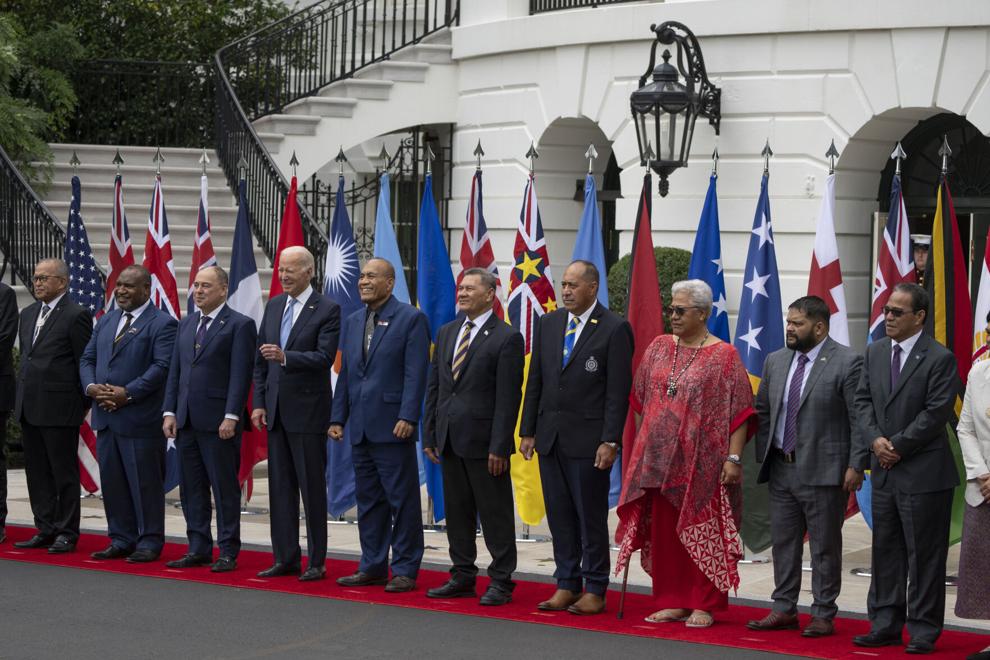U.S president Joe Biden’s latest bid to woo Pacific nations has been broadly welcomed by the region’s leaders and analysts, while some called for more to be done to support their economies and sought “results on the ground” over pledges.
Biden hosted a group of Pacific leaders at a summit in Washington this week, after a similar meeting a year earlier, in an effort widely seen as a push against China’s growing presence in the region.
Kaliopate Tavola, an ex-minister in Fiji and the country’s former ambassador to Brussels, said the U.S is “trying to catch up with others”.
“U.S chose to be absent from the Pacific for decades and it is coming back after that long absence. But its return is obviously fuelled by the need to counter China,” Tavola said.
The U.S president pledged to work with congress to provide US$200m in funding for projects in the region aimed at mitigating the effects of climate change, spurring economic growth, countering illegal fishing and improving public health, according to a statement. The U.S also said it will open diplomatic ties with two more Pacific islands nations, the Cook Islands and Niue.
“The United States is committed to ensuring an Indo-Pacific region that is free, open, prosperous, and secure,” Biden said at the welcoming ceremony in Washington.
The U.S listed a long series of focus areas for “enhanced” Pacific engagement including trade ties and economic development, and tackling climate change.
“Much is promised. [We] need to see results on the ground,” Tavola said, in relation to a pledge to enhance “people-to-people” ties.
Ensuring security for the region was another element of the talks that comes as Washington and Beijing jostle for influence in the region.
In May, Papua New Guinea signed a defence and maritime cooperation agreement with the U.S. Papua New Guinea is the most populous Pacific island nation and its location just north of Australia makes it strategically significant.
The U.S deal comes after China signed a security agreement with Solomon Islands in 2022. Solomon Islands prime minister Manasseh Sogavare, now closely aligned with Beijing, did not attend the White House talks this week.
Tavola said the “geopolitical tensions between the two world powers make the Pacific an unsafe space” for island nations in the region.
Papua New Guinea prime minister James Marape, called for the U.S to support the Pacific country beyond security deals.
Marape said looking back from the first summit in 2022, Papua New Guinea came to the latest White House talks “from a much-improved relationship” with the U.S “but that is mostly from the security perspective, which we must step up on all other fronts.”
“The full strength of our relationship must also embody other development areas including commerce, trade and economics,” Marape said in a statement.
Palau president Surangel Whipps Jr described the summit as “remarkable” praising Biden for his leadership in bringing the Pacific leaders together to address shared challenges calling it “unprecedented.” In a statement from his office, Whipps said those challenges included rebuilding Pacific economies after Covid.
He said the summit was an “important gathering of family”.
Cook Islands prime minister Mark Brown also welcomed the elevation of US relations with his country and said the U.S-Pacific islands partnership could be an important tool for helping the region achieve its aspirations.
Some in the Pacific also raised concern over whether the funds would be delivered.
“There are some very valuable initiatives in there … some long overdue,” Paul Barker, executive director at the Institute of National Affairs in Port Moresby, said.
Barker said the list included new and ongoing areas of engagement, while cautioning it remained “dependent on approval by Congress.”
Dr Meg Keen, director of Pacific Island Programmes at Australia’s Lowy Institute, said that although the US had opened new embassies and a USAID office in the region since last year’s summit, Congress had yet to approve most of the funding pledges made in 2022.
Tavola said the U.S system that governs and allocates fund to the region “is not conducive to approving sufficient funds for the Pacific on a timely basis.”
“Much of the U.S’s promises can be slowed and snowed under by much bureaucracy,” he added.
SOURCE: THE GUARDIAN/PACNEWS














